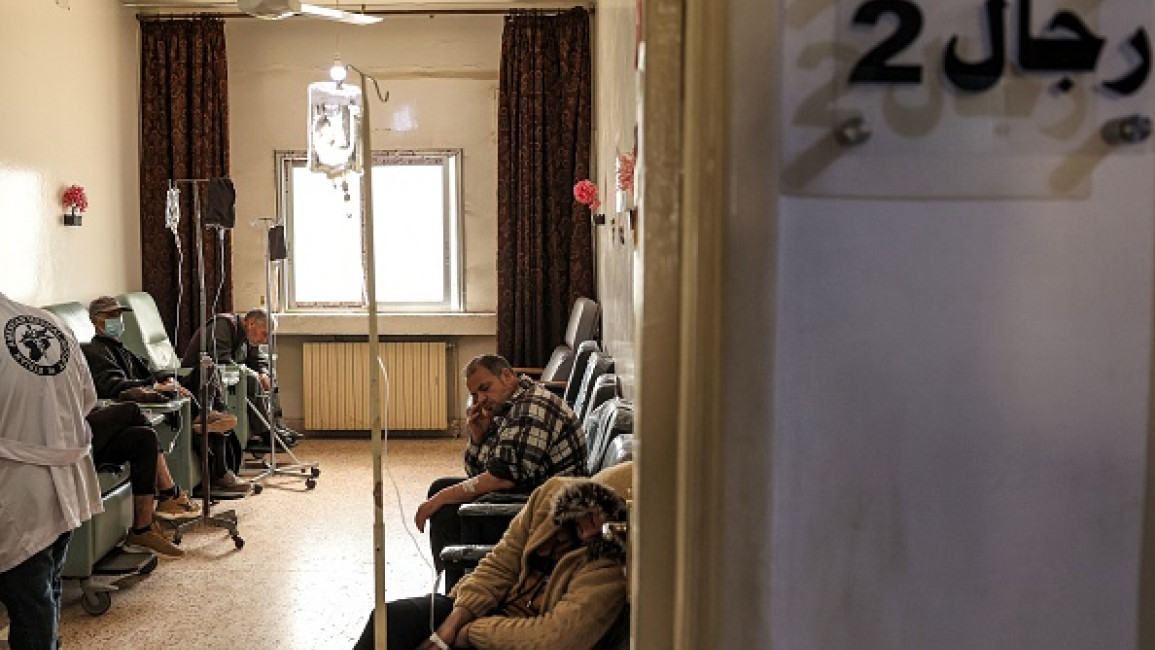Syria TV presenter shaves head in solidarity cancer sufferers at home
A Syrian television presenter shaved his head live on air on Friday in solidarity with cancer patients in his home country.
Abed Melhem, a present of the programme 'Repost' on Istanbul-based Syria TV, shaved his head to show support for cancer patients in northern Syria.
It comes as part of the #SaveThem campaign launched by Syrian activists who have called for intervention to save hundreds of lives.
Swathes of northwestern Syria remain largely outside of regime control, and humanitarian aid delivery has often been hampered due to this issue.
حلق شعره على الهواء مباشرة
— تلفزيون سوريا (@syr_television) July 21, 2023
📌عابد ملحم @abedmelhem مقدم برنامج #ريبوست في تلفزيون سوريا يتضامن مع مرضى السرطان في الشمال السوري
📌يذكر أن ناشطين سوريين أطلقوا حملة "#أنقذوهم"، وتضامنوا مع المئات من مرضى السرطان في الشمال السوري جميعهم يحتاجون إلى العلاج في أسرع وقت ممكن، مطالبين… pic.twitter.com/wwAu7FZ9pD
"We are need of any voice, of any action, anything that will bring attention to the suffering of our people in northern Syria, to stand in solidarity with them during their ordeal," says Melhem.
"There are a lot of people who carry out solidarity campaigns…maybe there is nothing we can actually do, except, maybe, grab the attention of the World Health Organization, the attention of all those who say they are responsible for the suffering of these [Syrian] people and stand by the cancer patients in northern Syria."
He then turns on the trimmer and shaves his head.
Social media users commended the TV presenter for his gesture.
Many other Syrian doctors, activists, journalists and more have also shaved their heads in solidarity.
"The situation in northern Syria is complex and very tragic at all levels," Melhem said in comments made to The New Arab.
"It is the most difficult for cancer patients as there is no treatment centre, and its customary for patients to cross the border into Turkey for treatment," he added.
But he says their situation worsened dramatically when the border with Turkey was shut and patients were no longer allowed to enter following the devastating 6 February earthquake.
The powerful earthquake lefts massive swathes of southeast Turkey and northwest Syria in ruins, killing tens of thousands of people.
"The campaign was only to draw the attention of Turkey, the international community and international organisations, especially the World Health Organization, to the suffering of these patients and to find an effective and quick solution for them," Melhem told The New Arab.
According to Imad Zahran, head of the Idlib health directorate’s media office, admissions into Turkey have resumed but only for some people, particularly those who hold Turkish identity cards known as Kimlik.
Dr. Abdel Moneim Zaineddin from the Syrian opposition has appealed to Turkey in a video message to admit cancer patients from northern Syria to receive treatment in Turkish hospitals.
He said there were 3,000 patients in northwestern Syria’s, 65% of which are women and children.
مناشدة لإنقاذ مرضى السرطان في الشمال السوري المحرر.#انقذوا_مرضى_السرطان#savecancerpatients#kanserhastalarınıkurtarın#Krebspatienten_retten pic.twitter.com/lw3YwIjkyX
— د.عبد المنعم زين الدين (@DrZaineddin) July 19, 2023
Zaineddin called on international charities and humanitarian organisations to find a radical solution to the crisis, proposing that integrated health centres are established along the Syrian-Turkish border in a safe area "away from [Bashar] al-Assad’s forces and their Russian and Iranian allies who bomb hospitals and medical centres."
Iran and Russia both maintain strong military and economic interests in Syria as a result of their military support for the regime, including Moscow's control of the Hmeimim and Tartous bases on the coast.
The United Nations is concerned about "unacceptable conditions" set by the Syrian regime of President Bashar al-Assad for allowing aid to flow through the Bab al-Hawa crossing to rebel-held areas in the northwest.
The delivery of humanitarian aid through the crossing has been stalled since Monday, when a 2014 UN deal expired.



